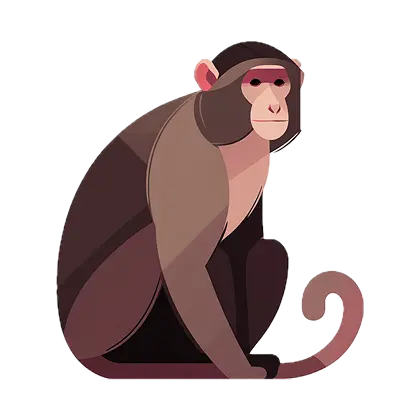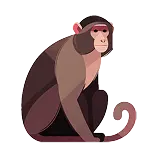

Monkey (noun) — a primate with a long tail and hands that allow it to climb here and there easily, as it’s their core way to move (using lianas and trees). This animal is one of the most popular for children’s cartoons, and it is depicted as a funny and cute character who likes bananas and fooling around.
How to Pronounce “Monkey”?
Put emphasis on the first letter of the word, with u sound as in the word “butter.” Then you say soft n and k with long ee.
Level up your English with Koto!
Examples: How to Use “Monkey” in a Sentence
You can remember the meaning of “monkey” without learning it by heart. Just remember it with the real-world context, just like in the samples below:
What Are Synonyms for the Word “Monkey”?
You need to define a “monkey” and one of the ways for it — to learn more words that can name this animal. You will make your language richer and your speaking more interesting.
Related nouns: ape simian
Synonyms (contextual): primate gorilla chimpanzee
Common collocations: cute monkey play with a monkey brown monkey
“Monkey” Word Formation and Description in Context
The word “monkey” doesn’t exist on its own and typically, you add it to sentences with other parts of speech. Here are some examples of how it works:
With adjectives: little monkey curious monkey joyful monkey
With verbs: groom a monkey a monkey eats a monkey laughs
With nouns (noun + noun): monkey food monkey zoo
Idioms and Phrases with “Monkey”
Using special phrases when learning how to say “monkey” will make you more confident in English. These idioms are used by native speakers, so you will understand them deeply.
-
Monkey(ing) around — procrastinate a task or a job, to fool around, etc.
I train my discipline to notmonkey around when doing homework. -
Monkey business — unwell behavior from someone.
My mum will never acceptmonkey business in our house. -
Make a monkey out of someone — refers to the situation when a person makes another person look like a fool.
They made amonkey out of me , but I found it funny too.
Take a Quiz for the “Monkey” Word
You learnt the “monkey” meaning and it is time to be sure you get it right. Here is a little and fun challenge for you:
Enjoy personalized learning!
“Monkey” Word in Other Languages
You can get a better and deeper understanding of the usage of “monkey” when learning this word in three different and popular languages.
| Language | Word for “Monkey” |
|---|---|
 Spanish
Spanish |
Mino |
 French
French |
Singe |
 German
German |
Affe |
Fun and Unusual Facts About “Monkey”
Monkeys are not the most common animals in our lives, unless you live on territories that are natural for them. Then, these facts can make an impression on you:
-
The monkey who lived the longest was an orangutan.
58 years is quite a lot for a wild great ape, and it depends on the life conditions, nutrition and other nuances that are also common for humans. -
Monkeys can build strong relationships.
You have definitely seen videos of these animals picking dirt and bugs from others’ fur, and it is common for them because it makes their connections powerful. -
Capuchins can use tools for various cases.
For example, they can crack nuts with a stone to get food, which they have been doing for hundreds of years. Sticks are also common for them, as they dig to access provisions in the earth.
How is “Monkey” Used in Quotes?
You have answered the question, “What the ‘monkey’ is?” and if you are interested in how it is used in famous books, here are some featuring sayings that will help you:
Explanation: This metaphor here tells readers that the speaker in a book didn’t find their place, and while everyone around fits well, they are disconnected from others.
— Naval Ravikant
Explanation: It may sound offensive at first glance, but it is actually more like a fun way to say to someone, “Relax.”
— James S.A. Corey
Explanation: Sounds fun, but that’s actually the truth — why would a monkey need to do it? There is no need for them in such a technology, and it makes us think about the way we use ours.



